Directory Listing¶
Retrieves a listing of a directory in the Backendless file storage:
Method:
¶
Future<List<FileInfo>> Backendless.files.listing(String path, [String pattern, bool recursive, int pagesize, int offset]);
where:
| Argument | Description |
|---|---|
path |
Path of a directory to get a listing of. The path must start with the root directory identified by forward slash, for example: "/web". |
pattern |
A pattern which the returned files and directories must match. The pattern can include wildcard characters. Asterisk (*) matches a substring of any length. Question mark (?) matches only one character in the file/directory name. |
recursive |
An optional parameter. If present and is true, requests that the listing must be retrieved recursively for all directories contained within |
pagesize |
An optional parameter. If present, identifies how many items should be returned in the response. |
offset |
An optional parameter. If present, indicates the index of item in the response from which to get the <pagesize> items. |
Return value¶
A collection of files and directories matching the specified pattern. The returned collection may not include all files and directories as the size of the number of returned entries is limited for paging purposes. To get the next set of file/directory entries, an additional request must be made with a different offset value. The total count of all files/directories in the listing use the Get File Count API.
Each element in the collection contains the following properties:
- name - name of the file or directory without any path information
- public URL - absolute URL of the file or directory
- URL - relative URL of the file or directory starting from the root of the file storage
- created on - a timestamp indicating when the file or directory were created
Example¶
The example below describes how to get a listing of all HTML files from the /web directory and all subdirectories.
Backendless.files.listing("/web", "*.html", true).then((response) {
for (FileInfo fileInfo in response) {
print("File url: ${fileInfo.url}");
print("File public url: ${fileInfo.publicUrl}");
print("File createdOn: ${fileInfo.createdOn}");
print("File name: ${fileInfo.name}");
print("----------");
}
});
Errors¶
The server may return the following errors:
| Error Code |
Error message |
Notes |
|---|---|---|
| 6000 |
File or directory cannot be found. |
Occurs when the source file/directory cannot be found. |
| 6006 |
Path contains prohibited symbols: {path name} |
|
| 6007 |
The specified resource was not found |
Occurs when the API requests to rename a non-existent file or a directory. |
| 6029 |
Specified resource must be a directory |
Occurs when the path to get a listing for is not a directory |
Codeless Reference¶

where:
| Argument | Description |
|---|---|
path |
Path of a directory to get a listing of. The path must start with the root directory identified by forward slash, for example: "/web". |
pattern |
An optional parameter. A pattern which the returned files and directories must match. |
include subdirectories |
An optional parameter. A boolean value of true or false. If it is true, requests that the listing must be retrieved recursively for all directories contained withinpath. |
page size |
An optional parameter. Identifies how many items should be returned in the response. |
page offset |
An optional parameter. Indicates the index of item in the response from which to get the page size items. |
Returns a list containing objects representing files and folders stored in the requested directory.
Consider the following files stored in the days directory:
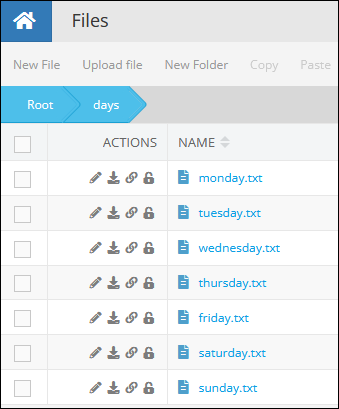
The example below retrieves a list containing all file names, as well as other related details. Files are retrieved from "days" directory.
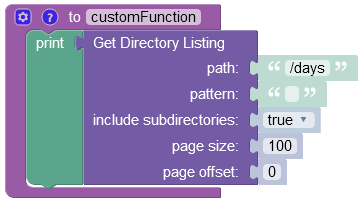
The result of this operation will look as shown below after the Codeless logic runs.
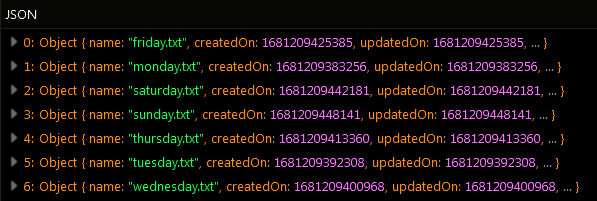
Consider the following files stored in the misc directory.
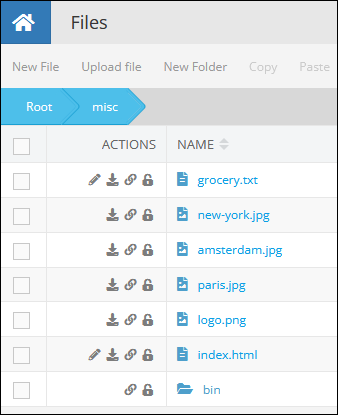
The example below uses the pattern argument to retrieve only those pictures whose file extension is .jpg.
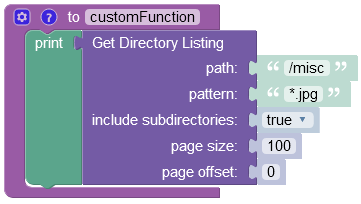
As you can see, the operation has retrieved a list containing file names matching the pattern argument.
